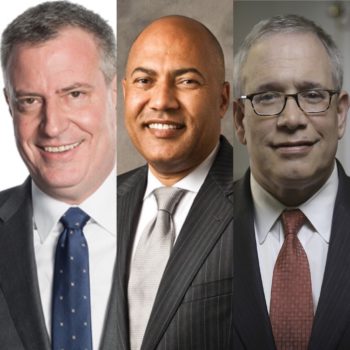
(Left to Right): Mayor Bill de Blasio, Department of Finance Commissioner Jacques Jiha, and Comptroller Scott Stringer./Image Credit: Office of the Mayor, Department of Finance, and Office of the Comptroller
The recommendation will also impact interest rates for small property owners not impacted by COVID-19. On May 13, 2020, the New York City Banking Commission recommended that the City Council create a new hardship exemption to eliminate interest on late payments for property taxes due in July for small property owners who faced financial hardship due to COVID-19. The Banking Commission is comprised of Mayor Bill de Blasio, Department of Finance Commissioner Jacques Jiha, and Comptroller Scott Stringer.
Every fiscal year, the Department of Finance administers the City’s property taxes and assesses different values for properties around the City. Finance will quarterly bill small property owners, owners who own properties with assessed values less than $250,000, for their property tax payments. The first payment is due on July 1st, which is the beginning of the City’s fiscal year, and subsequent payments are due on October 1, January 1 and April 1. Property owners are entitled to a grace period of 15 days after the due date where they can pay their property tax balance without interest. However, after the grace period, late payments will include a seven percent interest each day the payment is missed from the due date.
The recommended hardship exemption would eliminate interest on late payments for property taxes due in July for small property owners who have a financial hardship as a result of COVID-19. According to the Department of Finance, “hardship” is when there is a death or serious illness of a property’s owner or immediate family member, loss of income, or enrollment in the Department of Environmental Protection’s Water Debt Assistance Program. Those who want to qualify for the hardship exemption would have to submit appropriate documentation to the Department of Finance.
The Banking Commission also recommends a 3.25 percent interest on late payments in July and a 5 percent interest on late payments in October 2020, January 2021, and April 2021 for other property owners who do not qualify for the hardship exemption.
The City Council will need to take action on the Banking Commission’s hardship exemption recommendation. For the hardship exemption to take effect, it must be enacted through Local Law. The City Council will determine the specific details on how property owners can qualify for the exemption and what type of documentation needs to be shown to prove financial hardship.
“This pandemic has reaffirmed how difficult it is to be a working person in this country. We are doing everything in our power to help families who are struggling, and I hope these measures will provide some relief to New Yorkers in need,” stated Mayor Bill de Blasio.
“The COVID-19 crisis has created an unprecedented situation for millions of New Yorkers by upending their lives and creating vast income instability. To an unemployed New Yorker, the potential forgiveness of late payments may be the difference between paying back their taxes and facing foreclosure. We need to use every tool at our disposal to provide compassionate relief,” said NYC Comptroller Scott M. Stringer.
The New York City Small Homeowners Association stated that “the elimination of property tax interest is a step in the right direction but more needs to be done to help small homeowners. Small Homeowners and their tenants will need access to loans and grants. Small homeowners will need property tax deferrals and access to the Courts to resolve housing matters if government relief isn’t provided.”
The Banking Commission’s recommendation is one of the few measures the City has taken to provide financial relief to property owners. The Department of Finance has released several measures including tax exemption programs, interest deferral programs, and payment plan programs, to help property owners who have been financially impacted by COVID-19.
A Council spokesperson told CityLand that “the Council is reviewing the Banking Commission’s proposals. [They] are aware of the difficulties some property owners may have with July’s property tax payments and are looking for ways to help.”
By: May Vutrapongvatana (May is the CityLaw Fellow and New York Law School Graduate, Class of 2019).

